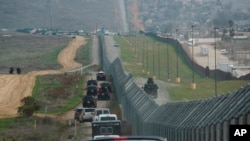Editor's note: With four people working on (im)migration stories every day, we still struggle to keep up with all the relevant news. So, we wanted a way to keep you updated with the top immigration stories every week — the ones that will affect you, our international readers, viewers and listeners — most. We want you to know what's happening, why, and how it could impact your life, family or business.
Questions? Want to know more about an immigration issue? Email the team. (immigrationunit@bbg.onmicrosoft.com)
National Guard heads to US-Mexico border
At the start of the week, Homeland Security officials said some 900 National Guard troops are headed to the U.S.-Mexico border to help U.S. Customs and Border Protection staff and to curb illegal activity in the region, such as drug smuggling and undocumented border-crossers.
What to expect from this? Other presidents have ordered troops to the border, so Trump isn't setting a precedent on that front. Officials say there may eventually be up to 4,000 troops stationed in the four border states. VOA's Ramon Taylor is on the southern border this week and will have plenty to report in the coming days. In the meantime, check out his Instagram for updates, including this snap of a Mexican police officer reading Gabriel Garcia Marquez's "Del amor y otros demonios" ("Of Love and Other Demons").
Seeking sanctuary
Around the U.S., dozens of undocumented immigrants with deportation orders are holed up in churches, where they feel more protected from the long arm of immigration officials. In some cases, their children visit them to keep the feeling of being a family going.
What's next? Trump and his administration have tried to target cities that decline to take action against undocumented immigrants, but as recently as Thursday, they've been stymied by the legal system: An appeals court said the federal government can't block public safety funds to these so-called sanctuary cities. Expect the legal battles to continue.
From desperation in East Africa to desperation in Yemen
Yemen has been locked in civil unrest — that escalated into a regional conflict — for years. Yet desperate asylum-seekers from the Horn of Africa still find their way to the country. But with a power vacuum and ongoing bombing from Saudi Arabia, "it is very chaotic and very difficult to really know who is really in control," a U.N. refugee agency spokesman told VOA. And there is no recourse for the migrants, who describe abuse and deplorable conditions. Meanwhile, the U.S. — in the midst of massive, Trump-led cuts to its refugee program — has accepted about 200 refugees from both Ethiopia and Somalia, and none from Yemen since the fiscal year began Oct. 1, 2017.
To compare how much has changed: By this time last year, roughly 600 Ethiopian refugees and 5,000 Somalis had come to the United States, but only 18 Yemenis, so that low number hasn't changed much.
Supreme Court backs ruling on some immigrant criminal offenders
The U.S. Supreme Court made deporting some legal immigrants with criminal records a bit more difficult this week, with a 5-4 ruling that addressed inconsistencies in what is considered a "crime of violence," and consequently grounds for expulsion from the country.
On deck for next week
On April 25, at 10 a.m. EST, the U.S. Supreme Court will hear oral arguments in a lawsuit over the Trump administration's order limiting travel from largely Muslim-majority countries (Chad, Iran, Libya, North Korea, Syria, Venezuela, Somalia and Yemen). The court will assess whether the travel ban, which is currently in effect, violates immigration law and the Constitution. VOA will be inside and outside the high court Wednesday for the proceedings.




